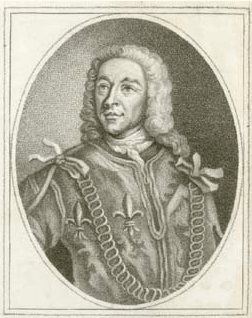John Warburton (officer of arms) facts for kids
John Warburton (born 1682, died 1759) was a special kind of historian called an antiquarian. He loved studying old things like books and maps. He was also a cartographer, meaning he made maps. For a while, he worked at the College of Arms as the Somerset Herald of Arms in Ordinary, which meant he helped keep track of family histories and coats of arms.
Contents
Life Story
John Warburton was born to Benjamin and Mary Warburton. When he was younger, he worked as an exciseman, collecting taxes on goods, and then became a supervisor. In 1719, he became a member of the Royal Society, a famous group for scientists, but he later left because he didn't pay his fees. He also joined the Society of Antiquaries of London, another group for people who study history. In 1720, he got his important job as Somerset Herald at the College of Arms.
John Warburton was married twice. His first wife was Dorothy, but they separated. Later, he married a widow who already had children. He also had a son named John with his second wife. John Warburton passed away in London on May 11, 1759, at his home in the College of Arms. He was buried in a church called St Benet Paul's Wharf.
His Work
John Warburton created many maps. In 1716, he published a large map of Northumberland. Over the next few years, he made similar maps for other areas like Yorkshire, Middlesex, Essex, and Hertfordshire.
In 1749, he released a "Map of Middlesex." This map had about 500 family coats of arms drawn around its edges. Some people, like John Anstis the Younger, thought some of these coats of arms might not be real. So, a high-ranking official ordered that no more copies of the map could be sold until it was proven that the families had the right to use those symbols. Warburton tried to explain himself in a book he wrote that year.
In 1753, he published a book called Vallum Romanum. This book was about the history of the Roman Wall (Hadrian's Wall) in Cumberland and Northumberland, which he had surveyed himself in 1715. Another historian, William Hutton, praised Warburton for being truthful in his work.
Later, in 1779, a book called Some Account of the Alien Priories was published. It used information collected by Warburton and another person named Ducarel. At first, their names weren't on the book, but this was fixed in later versions.
His Collections and a Big Mistake
John Warburton loved collecting old books and handwritten papers, called manuscripts. But he was also quite careless with them! In 1720, he sold many valuable manuscripts to the Earl of Oxford.
Even more famously, he once left a large pile of old play manuscripts in his kitchen. About a year later, when he went to look for them, almost all of them were gone! His cook, Betsy Baker, had used over 50 of these rare manuscripts as scrap paper for cooking. She used them to light fires or to line the bottom of pie pans when baking. This meant many unique old plays were lost forever!
Despite this carelessness, Warburton still left behind a huge collection of books, manuscripts, and prints when he died. These were sold at an auction in 1766. Many of his handwritten notes about places are now kept in the British Museum.
Lost Plays: A Sad Story
Because of the cook's actions, many important old plays were destroyed. Imagine losing a piece of history like that! Here are just a few examples of the plays that were lost:
- Alexias, or The Chaste Gallant, by Philip Massinger
- Beauty in a Trance, by John Ford
- Believe as You List, by Philip Massinger (This play was almost lost because it talked about sensitive political topics!)
- Duke Humphrey, which some people believed was written by William Shakespeare
- The Fair Favorite, by William Davenant
- The Forced Lady, by Philip Massinger
- The Governor, by Sir Cornelius Formido
- Henry I, which was thought to be by William Shakespeare and Robert Davenport
- The History of Job, by Robert Greene
- The Judge, by Philip Massinger
- The Maiden's Holiday, which some thought was by Christopher Marlowe and John Day
- Minerva's Sacrifice, by Philip Massinger
- The Nobleman, by Cyril Tourneur
- The Parliament of Love, by Philip Massinger
- The Puritan Maid, the Modest Wife, and the ... Widow, by Thomas Middleton
- The Royal Combat, by John Ford
- The Tyrant, by Philip Massinger
- The Woman's Plot, by Philip Massinger
A play simply listed as "A Play by William Shakespeare" was also lost, along with a copy of Sir John Suckling's "Works."
Plays That Survived
Luckily, not all of Warburton's plays were destroyed. He listed three plays that managed to escape:
- The Second Maiden's Tragedy (now thought to be by Thomas Middleton)
- The Queen of Corsica (by Francis Jaques)
- The Bugbears (by John Jeffere)
Even some of the plays that Betsy Baker used for cooking were saved because other copies existed! For example, Believe as You List, The Fair Favorite, The Governor, The Inconstant Lady, and The Parliament of Love were preserved through other sources. It's also possible that some of the lost plays might exist today under different names. For instance, Shakespeare's Duke Humphrey might be an early version of a play we know as Henry VI, part 2, where Duke Humphrey is a very important character.
See also
- Cardenio
- Philip Massinger
- Cyril Tourneur
 | Emma Amos |
 | Edward Mitchell Bannister |
 | Larry D. Alexander |
 | Ernie Barnes |


